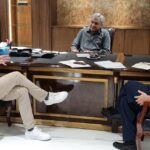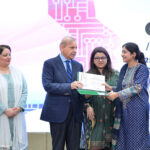
ISLAMABAD, Dec 23 (APP): The judges at Russell Tribunal looking into the Indian war crimes being committee in IIOJK have called for seeing the Kashmir dispute within a broader global context of “settler colonialism, genocide, and crimes against humanity”.
The judges made these statements at a maiden Russell Tribunal on Kashmir held by Kashmir Civitas, a Canadian registered NGOin Sarajevo, Bosnia.
The event was held in collaboration with World Kashmir Awareness Forum, Bertrand Russell Peace Foundation (Nottingham, UK), the Permanent People’s Tribunal of Bologna, Italy, Nahla (Center for Education and Research), the Center for Advanced Study in Sarajevo, International University of Sarajevo (IUS) and Aljazeera Balkans.
A panel of judges listened to the proceedings and, thereafter, finalize a report that will be distributed to UN agencies, EU parliament and other world bodies and governments.
“We the judges are present here today to submit our initial statement regarding the proceedings of the inaugural Russell Tribunal on Kashmir. A final, more thoroughgoing statement will be issued subsequently,” they said
They observed that serious accusations of genocide, crimes against humanity, rape as a weapon of war, unlawful arrests and mass blinding had been made.
The event marked the testimonies of multiple witnesses who narrated their accounts of ordeal faced by themselves or their fellow citizens.
Russell Tribunal on War Crimes in Kashmir 2021 aimed to replicate the significance and impact of the Russell Tribunal on Vietnam that gained worldwide press coverage and had a clear, discernible impact on transforming the narrative on Vietnam.
It was also aimed at paying homage to the courage of Professor Bertrand Russell, who dared to challenge American hegemony at the height of its power, the tribunal used that model to expose the crimes of India in IIOJK.
The international event was attended by international lawyer, Richard Falk, Professor Anthony Carty, Yvonne Ridley, David Hearst, Pepe Escobar, Jonathon Brown, Professor Sami Al Arian, Hatem Bazian, Tarek Chertaoul, Yvonne Ridley, David HearsEdward Moad, Tarek Cherkaoui, Khaled Beydoun, Dalia Mogahed Omar Suleiman and many more.
The event focused on four thematic areas including genocide, de-colonization, settler-colonialism, crimes against humanity and nuclear war – mass graves, rape as a weapon of war, and the ever present threat of nuclear war in this contested region.
It heard evidence of genocide, in Jammu in 1947 and 1948, during which time the Indian government and Dogra regime claimed to be directly responsible.
The tribunal unanimously agreed that the events need to be carefully recognized and studied. The accusations are grave and warrant deeper investigation.
The body stated that, “We have heard evidence from two genocide alerts given by Genocide Watch, an NGO led by Professor Gregory Stanton”.
In its conclusion, based on the statements, oral testimonies and reports the Tribunal found serious indications of constant restrictions on freedoms and gross human rights violations, including mass crimes, mass rapes and other crimes against humanity.
“From the allegations we have heard, these crimes seem to meet the definition of genocide,” the body concluded.
It called upon the international institutions in a strong worded statement, “This is only the beginning of a long process. Given the seriousness and gravity of these incriminations, it is important that international institutions and human rights tribunals urgently open cases and examine these allegations and prosecute those responsible for violations.”
“The reports we have heard suggest that the government of India, the Indian Army and the Indian Intelligence Service are responsible. This requires further investigation”.
The tribunal offered an open invitation to the world public to visit Kashmir and report on the state of freedoms and human rights.
The tribunal also called upon UN to properly oversee the decolonialization process in Kashmir. Just as the United Nations intervened and found that Britain had not properly completed the decolonialization process in Chagos Archipelago in the 1960s, it could offer a similar intervention vis-à-vis Kashmir”.
“This is the United Nations’ responsibility. As such, we call upon the United Nations General Assembly to request an advisory opinion of the International Court of Justice to characterize the Kashmir situation as an uncompleted decolonialization process and to recognize the legal force of the Security Council’s resolution calling for a plebiscite of the people of Kashmir in order that they may determine their future.”
The social media was flooded with the public reaction over the accounts of atrocities narrated by the witnesses at the Tribunal.
The fell into tears listening to the accounts of the Kashmiri women who had been suffering the “weaponized rape” by the Indian Occupation Forces which used it as their “primary weapon.”
“The most difficult part of the Russell Tribunal on Kashmir for all attendees had been listening to accounts of mass rape of Kashmiri women. Rape had been a primary weapon of the Indian army. Tribunal attendees were in tears at each account,” Mohamad H Elmasry wrote on Twitter.
Dr. Mohamad Hamas Elmasry is an Associate Professor in the Media and Cultural Studies Program at the Doha Institute for Graduate Studies.
Dr. Mubeen Shah, a prominent businessman in IIOJK, who also served as President of Kashmir Chamber of Commerce, spoke as a witness at the Tribunal saying, “India was on a major propaganda offensive to convince the world that its brutal occupation and repression in Kashmir were part of the epic battle against Muslim terrorism an epic battle that was completely manufactured to justify war, occupation, genocide.”
He told the Tribunal that since 1990, more than 100000 killed, 150000 civilians arrested, 8500 custodial killings, 12000 disappearances, 110000 structures destroyed, 11,170 rape cases, hundreds of thousands injured with at least 7000 with pellet injuries.
Highlighting the Indian occupation of resources, he mentioned power generation from water resources which is under their central government company NHPC Limited.
“The company had an asset base of 97 billion dollars with a yearly income of 710 million dollars. One-third of its generating capacity exist in Kashmir and had rightly got the name of “East India Company “in local parlance.”
He said the Chamber had fought regarding the return of the assets which were built with or without the agreement of limited time but never returned to the state although different commissions like Rangarajan Commission recommended the return of some projects.
The Chairperson Peace and Culture Organization (P&CO) Mushaal Hussein Mullick termed holding of Russell War Crimes Tribunal on Kashmir in Sarajevo, Bosnia and Herzegovina as a wonderful initiative to highlight war crimes committing by Indian forces in Indian Illegally Occupied Jammu and Kashmir (IIOJK).
In a statement, Mushaal, wife of jailed Kashmiri Hurriyat leader Muhammad Yasin Malik, called the initiative as a timely and much-needed move to expose the dirty face of the so-called large democracy of the world, turning Kashmir into a living hell.
Mushaal also said that the holding of the tribunal on Kashmir would help in raising awareness of the responsibility of the international community to prevent ongoing crimes against humanity and genocide of Kashmiris, as the world at present is largely enjoy sweat slumber and were little bothered about the war crimes committing by India in the valley.
The tribunal, with a focus on IIOJK, the epicenter of resistance included leading global, political, academic and literary figures and aspired to further clarify the reality of the situation, internationalize the crisis in Kashmir and compel the world to act.
Undoubtedly, the seriousness of this tribunal is in the transparent, democratic and rigorous scientific methods it will use to put forward its case against the Indian state.
Such transparency is essential to ensure that the process and outcome remain unblemished, which can thereby substantiate the aspirations of the people of the IIOJK.
The initiative can be termed as the beginning of arduous and judicious process to uncover truth, but the live testimonies and the reports and evidence presented during the proceedings of Russell Tribunal, have left with serious concerns about crimes, which appear to have been carried out on a massive scale.
APP Digital Report by Ishtiaq Ahmed







